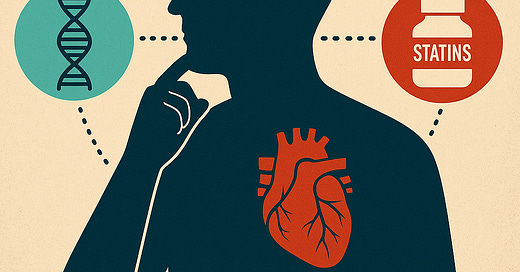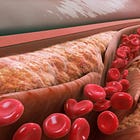Over the past week, I had 4 different patients come to see me after a heart attack or stroke who were terrified about being on a statin.
They’d read blog posts. They’d seen Instagram reels. They’d heard that statins are dangerous — that they cause dementia, diabetes, and who knows what else.
They were nervous, confused, and skeptical. And I get it. There’s too much damn health content out there, and statins - despite being probably the most studied drug classes in medicine - have somehow become the most polarizing medical intervention that my patients hear about.
But the internet discourse on statins is just one example of a much bigger problem with how health information gets discussed.
📣 The Misinformation Machine
Health content is everywhere. Intermittent fasting. Seed oils. Coffee extending lifespan. Vitamin D reversing aging. The ketogenic diet preventing heart disease.
Everyone has an opinion. Almost no one has expertise.
And that’s a real problem because when it comes to my patients, this stuff isn’t just about abstract ideas.
It’s about real people making real decisions that affect their lives, often based on bad interpretations of bad data.
Take a few recent examples:
The New York Times recently covered an observational study suggesting that coffee improves healthy aging. It’s not a randomized trial - this paper is incapable of proving causality. But the article gets a lot of press. It will shape - or at least justify - behavior. And it’s based on useless, hypothesis-generating data.
My wife showed me a post from some influencer on Instagram claiming that vitamin D is an anti-aging drug - probably because they saw that Harvard/Mass General Brigham Communications endorses the conclusion. Why? Because a sub-study of the neutral VITAL trial found an association between vitamin D and telomere length.
This ridiculous logic is two steps removed from reality:The VITAL trial showed no benefit in preventing cancer or cardiovascular disease.
Telomere length as an actionable target to slow aging is probably discredited — it hasn’t held up as a useful or meaningful clinical tool.
Or consider the Keto CTA study, where researchers followed patients on a ketogenic diet with coronary CTAs and found essentially the fastest progression of heart disease ever recorded. But the lead authors are now misrepresenting their own data, obscuring endpoints, and claiming there’s nothing risky about very high LDL cholesterol.
What’s wild is that the people downplaying that study live in the same online information sphere as many of the anti-statin voices. These perspectives often amplify each other and reinforce a narrative that’s really quite wrong.
🔄 Low-Carb Diets, High LDL, and Statin Skepticism
There’s a strong overlap between keto/low-carb advocates and statin critics. And I think I understand why.
Low-carb diets make a lot of people feel great.
They lose weight. Their blood sugar improves. Their blood pressure drops. They feel in control of their health for the first time in years.
And when a diet gives you those results - and makes you feel that good - it’s hard to hold two ideas in your head at once:
This diet is helping me.
This diet might also be raising my LDL cholesterol to dangerous levels.
That cognitive dissonance is tough to process. So instead, some people double down and say:
High LDL doesn’t matter.
Statins are dangerous.
Cholesterol guidelines are propaganda.
But none of these things are mutually exclusive.
It’s possible for a diet to help your weight and metabolic health and also increase cardiovascular risk over time.1
And it’s also possible for statins to reduce heart attack and stroke risk while also causing side effects in a considerable group of patients.
Don’t tell the influencers this, but you can believe that not everyone needs a statin without saying statins are poison.
But those gray zones don’t play well online. On social media, the strongest (and usually the worst) opinions rise to the top.
🔍 Back to Statins
If you want to understand how bad information spreads and how it impacts health, statins are a perfect case study.
These drugs are:
Among the most studied drug classes ever.
Proven to reduce heart attacks, strokes, and cardiovascular death.
Used safely by millions of people around the world.
And yet, a growing number of people believe they’re dangerous - because of podcasts, Instagram reels, and social media fear-mongering from people who have never treated a patient or actually read any of the research.2
Let’s break it down.
📊 The Evidence Is Boring (and That’s a Good Thing)
Statins have been tested in tens of thousands of patients, across dozens of trials, over decades. They consistently reduce the risk of major cardiovascular events.
Critics love to cite a big meta-analysis of RCTs showing no all-cause mortality benefit in patients without prior history of heart attack or stroke.
The confidence interval in that study ranged from 0.83 to 1.01, which, while technically not statistically significant, barely missed the mark and highly suggests that a benefit would have been found if follow up had been a bit longer or the patient groups had been higher risk.
And to cite a study like that as evidence why a patient who had a stroke shouldn’t be on a statin is completely incorrect:
The data is essentially unambiguous in secondary prevention - meaning patients who have had heart attacks or strokes.
If you want to reduce cardiovascular risk — statins are boring, safe, and effective.
And before you tell me that I’m missing the fact that LDL cholesterol isn’t the only thing that matters in heart disease, I’ve already written about that extensively:
But LDL is one of the most modifiable risk factors we have, and statins are the most widely accessible, cheap, safe, and effective tool we have to lower it.
They’re not the whole answer — but they’re a critical part of the equation.
💥 The “Scary” Statin Side Effects Aren’t That Scary
Let’s talk about the real side effects:
1. Muscle aches
Affect 8–10% of users. Typically mild, reversible, and show up quickly after starting and goes away after you stop.
2. Blood sugar rise
Raises A1c by 0.1–0.2%. That’s it.
“If a statin gives you diabetes, you were a Snickers bar away from diabetes anyway.”
3. Liver enzymes
Rarely elevated. Easy to monitor. Always reversible.
No mystery illnesses. No permanent organ damage. No wild anecdotes. Totally boring and routine side effect management.
And don’t forget that many statin side effects are actually the Nocebo effect anyway:
🧠 What About Statins and Dementia?
Perhaps the most insidious fear mongering in this area is in the cognitive health domain: statins cause dementia. The logic? Statins reduce cholesterol synthesis, and the brain needs cholesterol.
But let’s step back:
Statins reduce stroke, a major cause of vascular dementia.
Treating vascular disease lowers risk of Alzheimer’s, which most experts agree has a huge vascular component.
Statins almost certainly lower the risk of the two most common causes of dementia.
Sure, there are some studies with mechanistic concerns (but others that suggest a protective effect).
And it’s also true we don’t have 50-year prospective data on ultra-high-dose statins in healthy 30-year-olds.
But the real-world signal is protective from dementia, not harmful.
🌀 The Myth of the “U-Shaped Curve”
Some influencers say that low cholesterol is dangerous. That you can have too little LDL.
This comes from observational data where people with low LDL often have chronic illness, frailty, or cancer. But that’s correlation, not causation.
To believe statins cause death, you have to ignore the actual experimental evidence from the randomized trials where people get statins to actively lower their LDL and people do better.
This is the clearest possible evidence we have.
🤯 The Real Problem: Influence Without Accountability
We live in a moment where anyone can quote a study and reach the masses. That’s not inherently bad — but it is dangerous when the most viral voices aren’t accountable to the people that they influence:
People with heart disease who are scared about their health are persuaded that treatments with an incredibly favorable risk/benefit ratio are actually harming them.
And so I write about this topic because I see the impact every day in my clinic.
When you have to answer to a patient about the “why” behind your recommendation that impacts their personal health, it gives a different gravity than just pontificating into your phone camera.
❤️ Final Thought: For Real People, Nuance Matters
The internet rewards confidence, certainty, and strong opinions.
Unfortunately, the truth is almost always filled with nuance and complicated explanations.
There are tradeoffs. There are side effects. There’s no single answer for every patient. But on the whole, I feel pretty confident about the veracity of each of the following statements:
Statins lower cardiovascular risk.
They aren’t for everyone.
LDL isn’t the only thing that matters.
High LDL from a low-carb diet can still be risky.
A diet that makes you feel great can still have hidden costs.
These ideas aren’t contradictions. They’re what reality looks like.
I see patients every day who have had strokes and heart attacks. These people are doing their best, reading what’s out there, trying to stay informed.
And too often, what they’re exposed to is misinformation or oversimplification masquerading as clarity.
And that has consequences.
After all, there’s no evolutionary concern about high LDL - most people with really high numbers don’t suffer the consequences until way past reproductive age. So it’s logically plausible that a diet we evolved to eat may actually accelerate heart disease (which, at its core, is almost a disease of human aging) over the long haul.
It’s certainly possible to be really well informed even if you aren’t credentialed, just like it’s possible to be highly credentialed and be filled with ignorance. But actually doing your homework here requires reading the paper, not just someone else’s predigested conclusion about what the paper says.





